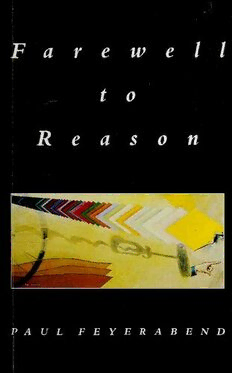
Farewell to Reason PDF
Preview Farewell to Reason
"1 1 ',1 ii t a r e ] 1 0 1 t R n e a s o j, t FEYERABEND PAUL FareweU to Reason V 1 Digitized by the Internet Archive 2015 in https://archive.org/details/farewelltoreasonOOfeye Farewell to Reason PAUL FEYERABEND V VERSO London • NewYork First published by Verso 1987 Reprinted 1988, 1990, 1993 © 1987 Paul Feyerabend All rights reserved Verso UK: 6 Meard Street, London WIV 3HR USA: 29 West 35th Street, New York, NY 10001 2291 Verso is the imprint ofNew Left Books British Library Cataloguingin Publication Data Feyerabend, Paul Farewell to reason. 1. Relativity 2. Rationalism L Title 153.4'3 BD221 US Library ofCongress Cataloging in Publication Data Feyerabend, Paul K., 1924- Farewell to reason/Paul Feyerabend p. cm. Collection ofessays rewritten for publication in book form. 1. Philosophy. L Title. B29.F448 1987 100—dcl9 ISBN 0-86091-184-5 ISBN 0-86091-896-3 Pbk Printed and bound in Great Britain by Biddies Ltd, Guildford and King's Lynn Contents Introduction 1 1. Notes on Relativism 19 2. Reason, Xenophanes and the HomericGods 90 3. Knowledge and the Role ofTheories 103 4. Creativity 128 5. Progress in Philosophy, the Sciences and the Arts 143 6. Trivializing Knowledge: Comments on Popper's Excursions into Philosophy 162 7. Mach's Theory ofResearch and its Relation to Einstein 192 8. Some Observations on Aristotle's Theory of Mathematics and ofthe Continuum 219 9. Galileo and the Tyranny ofTruth 247 10. Putnam on Incommensurability 265 11 Cultural Pluralism or Brave New Monotony? 273 . 12. Farewell to Reason 280 Index 320 Introduction The essays collected in this volume deal with cultural diversity and cultural change. They try to show that diversity is beneficial while uniformity reduces our joys and our (intellectual, emo- tional, material) resources. There exist powerful traditions which oppose such a point of view. They concede that people may arrange their lives in various ways; however they add that there must be limits to variety. The limits, theysay, are constitutedbymorallawswhich regulate human actions and by physical laws which define our position in nature. Philosophers from Plato to Sartre and scien- tists from Pythagoras to Monod have claimed to possess such laws and have complained about the variety (of values, beliefs, theories) that still remained. In the late seventies and the early eighties these complaints increased in urgency. 'Contemporary culture', we hear, is in a 'crisis'. It is torn apart by a 'profound contradiction between the traditional humanist views of man and the world on the one hand, andthe value devoidmechanisticdescriptionofscienceon the other' while the humanities, philosophy, the arts, and social thought are in addition corroded by a 'cultural cacophony', or a 'philosophical malady'. So extreme is the fragmentation per- ceived by some critics that Jurgen Habermas recently spoke ofa 'neue Uniibersichtlichkeit' - a new unsurveyability: it is impos- sible to find one's way in the flood of styles, theories, points of view, that inundate public life. ^ 1. Forthe 'crisis' andthe 'profoundcontradiction'see RogerSperry,Science andMoral Priority, NewYork 1985, p. 6. Fortheclashbetweenthesciencesand 1 2 The complaints are surprisingly uninformed. It is true that 'culture' occasionally gets somewhat disorganised. But the trend is not new and it is balanced by powerful contrary tendencies: schools outflank, overrun, absorb other schools, scientists from different fields create interdisciplinary subjects (examples: synergetics; molecular biology), grand 'unifying schemes (evo- lution; holism; dualistic solutions of the mind-body problem; linguistic speculations) blur important distinctions, film, computer art, rock music, high energy physics (cf. Andrew Pickering's fascinating essay Constructing Quarks, Chicago 1985) combine business principles, artistic inspiration and scien- tific discovery in a manner reminiscent of 15th century Renais- sance practice. There is fragmentation; but there are also new and powerful uniformities. The lack of perspective displayed by the critics is even more astonishing. They speak of 'the (!) crisis of contemporary culture' or of 'world culture'; what they mean is Western academic and artistic life. But the quarrels ofprofessors and the contortions of Western art shrink into insignificance when com- pared with the steady expansion of Western 'progress' and 'development' which is the spreading of Western business, science and technology. This is an international phenomenon; it characterises capitalist as well as socialist societies; it is inde- pendent of ideological, racial and political differences and it affects an increasing number of peoples and cultures. There is hardly any trace here of the debates and disagreements that so exercise our intellectuals. What is being imposed, exported and again imposed is a collection of uniform views and practices which have the intellectual and political support of powerful groups and institutions. ^ By nowWesternforms oflife arefound in the most remote comers of the world and have changed the habits of people who only a few decades ago were unaware of their existence. Cultural differences disappear, indigenous crafts, customs, institutions are being replaced by Western humanities cf. CP. Snow, The Two Cultures and the Scientific Revolution, Cambridge 1959 and W.T. Jones, The Sciences and the Humanities, Univ. of CaliforniaPress 1965. Jonescallstheriftbetweenthesciencesandthehumanities 'the crisisofcontemporaryculture'. The phrase 'culturalcacophony'occursinan issue of the journal Precis, introducing a discussion of postmodernism at the Columbia University School ofArchitecture; the 'malady' in K.R. Popper, The Open Society and its Enemies, Vol. 2, New York 1966, p. 369. Habermas's observations arefoundin DieNeue Uniibersichtlichkeit, Frankfurt 1985. 2. Decisive amongthesegroups isa newclass, ascientific-technologicalelite which, according to some writers (Daniel Bell and John Kenneth Galbraith
